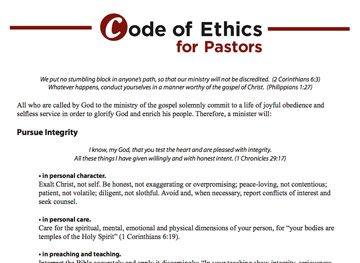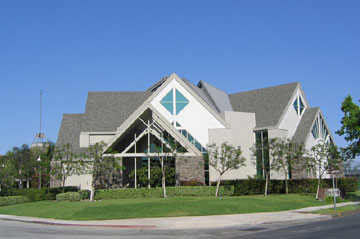Code of Ethics for Pastors:
A Commentary
What is the Code of Ethics for Pastors?
Do We Need a Code of Ethics for Pastors?
What are the Code’s Strengths and Weaknesses?
by Rev. Dr. Mark D. Roberts
Copyright © 2012 by Mark D. Roberts and Patheos.com
Note: You may download this resource at no cost, for personal use or for use in a Christian ministry, as long as you are not publishing it for sale. All I ask is that you give credit where credit is due. For all other uses, please contact me at [email protected]. Thank you.
Introduction
The National Association of Evangelicals has just released a new Code of Ethics for Pastors. This three-and-a-half page document features five major admonitions for ethical behavior:
Pursue Integrity
Be Trustworthy
Seek Purity
Embrace Accountability
Facilitate Fairness.
Under each category, there are several statements of clarification or application.
 Why has the NAE created this Code? According to the NAE Press release:
Why has the NAE created this Code? According to the NAE Press release:
With a desire for pastors to make sound ethical decisions and to flourish, the National Association of Evangelicals developed the NAE Code of Ethics for Pastors designed to provide a consistent code of ethics that crosses denominational lines.
“Most pastors are highly ethical, but few have signed a written code of ethics,” said Leith Anderson, NAE President. “This is every pastor’s opportunity to know, commit and tell others about a personal and professional standard of biblical pastoral ethics. I invite every pastor and every church board to put this code of ethics on the agenda for an upcoming meeting. Discuss. Adopt. Live these standards.”
Luder Whitlock, who chaired the document’s taskforce, adds:
Thanks to the leadership of Leith Anderson, the board of the NAE has prepared a long overdue Code of Ethics for Pastors. This succinct statement provides guidance for pastors who desire to honor the Lord by their example as well as by what they confess and preach. We expect it will soon become indispensable as a reference for pastoral ethics.
The Code has been signed by several prominent evangelical pastors, including:
Charles Blake, West Angeles Church of God in Christ; Joel Hunter, Northland, A Church Distributed; Bill Hybels, Willow Creek Community Church; Tim Keller, Redeemer Presbyterian Church; Max Lucado, Oak Hills Church; John Ortberg, Menlo Park Presbyterian Church; Samuel Rodriguez, New Season Christian Worship Center; and Bryant Wright, Johnson Ferry Baptist Church.
My initial reaction? Gratitude to the NAE and to those who crafted the Code. Appreciation for their wisdom. Curiosity about what the Code says (and doesn’t say) and why. And, as I read through the Code for the first time, I felt both encouraged and challenged in my own life and work as a pastor. This is a fine statement. I need it. Pastors need it. The church needs it.
What’s Missing from the NAE Press Release
As I read the NAE press release, I was a bit surprised to find something missing, something I strongly expect has motivated the NAE to compose the Code. I wonder why it was not mentioned. I’m talking about the fact that so many pastors these days are falling short when it comes to pastoral ethics. Yes, Leith Anderson is right, “Most pastors are highly ethical.” But, I’m sad to say, thousands of pastors are not. I’m not just talking about occasional failures, which would be expected of human beings in general, including pastors. Rather, I’m thinking of patterns of unethical behavior that can undermine pastoral ministry and devastate church communities. We can all think of some of the most obvious examples of this sort of thing because they regularly fill the headlines. But I have watched with sadness as dozens of ordinary pastors in ordinary churches have been removed from their pastorates or choose to resign because of moral failures. I know the NAE is all too aware of this reality because one of their former presidents was forced to resign his own pastorate for this reason.
Moreover, if you take the five admonitions of the Code – pursue integrity, be trustworthy, seek purity, embrace accountability and facilitate fairness – you could easily chart out the major areas of pastoral failure in our day: lack of integrity, untrustworthiness, impurity, lack of accountability, and unfairness. But the NAE doesn’t mention say this in their press release. Why not?
Reading between the lines, my guess is that the NAE wanted to focus on the positive rather than the all-too-familiar negative. The organization seeks to encourage, challenge, and support all pastors, including those who are among the majority who are truly seeking to live with integrity in all they do. Moreover, the positive approach of the NAE will, I hope, foster a conversation in the church and culture that doesn’t focus on failures, but rather that seeks to clarify and promote a high standard for pastors.
In the days ahead, I will examine the Code of Ethics for Pastors in some detail, offering my reflections and an occasional criticism as someone who has been a pastor for twenty-five years.
Could the NAE Be a Little More Welcoming?
I do have one initial criticism, not of the Code itself, but of the mechanism for pastors to sign the Code. When I went to sign, I got to the menu for “Denomination.” There was a scrolling menu. I looked for Presbyterian Church USA, and did not find it. I found the Presbyterian Church in America and the Evangelical Presbyterian Church. But no PCUSA. I had to choose “Other” as my denomination. Now, I realize that the PCUSA itself is not an evangelical denomination. Perhaps the only denominations that get listed are the ones with an official NAE connection. But there are thousands of evangelical pastors in the PCUSA who might very well want to sign the Code. The same is true of United Methodists, Evangelical Lutherans, etc. It would feel more welcoming (and, indeed, truthful) if we could acknowledge our denominational affiliation. I hope the NAE will edit their menu to be more inclusive of evangelicals in a wide array of denominations. At least give us a chance to explain the meaning of “Other.”
If this sounds petty, I apologize. But I think one of the sad failings of American evangelicalism is the tendency to draw lines that exclude people, creating a conservative Christian ghetto that can be irrelevant both to the larger church and to the culture. Usually, the NAE doesn’t fall into this trap. I hope they escape from it soon. Moreover, it would serve the NAE’s purposes well if it was seen that the Code was relevant to a wider array of pastors and churches.
Still, my last word for this introduction is, once again, one of thanks to the NAE for crafting the Code of Ethics for Pastors. This is a wise and timely document.
Do We Need a Code of Ethics for Pastors?
Last Friday, I began to comment on a new Code of Ethics for Pastors, published by the National Association of Evangelicals. Today, I want to continue my commentary by asking: Do we really need a Code of Ethics for Pastors?
“No,” say several of those who commented on my post or in emails. “We simply need pastors to honor to biblical teachings on how Christians, including leaders, ought to behave. Why have a Code of Ethics for Pastors besides what we already find in Scripture. Isn’t the Bible enough? And if pastors aren’t following biblical guidelines for their work, then why would we think a Code of Ethics might make some difference in pastoral behavior?”
I understand the rationale and feelings of those who lament the creation of the Code. And, to an extent, I agree with those who say that the Bible should be enough. In fact, the Code is really just a codification of certain biblical principals as they are relevant to pastoral ministry. If this is the case, why bother to create the Code? Why not just let Scripture speak for itself?
Let me answer these questions briefly.
Following the Example of the New Testament
Within the writings of the New Testament, we can find passages that could be described as codes of ethics for pastors. Consider, for example, 1 Timothy 3:1-13:
The saying is sure: whoever aspires to the office of bishop desires a noble task. Now a bishop must be above reproach, married only once, temperate, sensible, respectable, hospitable, an apt teacher, not a drunkard, not violent but gentle, not quarrelsome, and not a lover of money. He must manage his own household well, keeping his children submissive and respectful in every way— for if someone does not know how to manage his own household, how can he take care of God’s church? He must not be a recent convert, or he may be puffed up with conceit and fall into the condemnation of the devil. Moreover, he must be well thought of by outsiders, so that he may not fall into disgrace and the snare of the devil.
Deacons likewise must be serious, not double-tongued, not indulging in much wine, not greedy for money; they must hold fast to the mystery of the faith with a clear conscience. And let them first be tested; then, if they prove themselves blameless, let them serve as deacons. Women likewise must be serious, not slanderers, but temperate, faithful in all things. Let deacons be married only once, and let them manage their children and their households well; for those who serve well as deacons gain a good standing for themselves and great boldness in the faith that is in Christ Jesus.
In this passage, the Apostle Paul spells out certain standards for church leaders. He summarizes biblical principles that can be found elsewhere. He is writing, not just for individual leaders, but for the church so that it might acknowledge leaders who will lead well.
Those who drafted the Code of Ethics for Pastors were imitating the example of Paul by emphasize moral guidance for church leaders today. But, one might ask, why not simply use what Paul wrote? It is, after all, part of divine Scripture. Why write something new today when we already have a biblical code of ethics for pastors?

My answer would be that biblical truth needs to be considered and applied in each and every cultural situation. As times change, as situations change, as cultures change, the need will arise for fresh articulations and applications of God’s timeless truth. For example, the Code of Ethics for Pastors includes a section called “Facilitate Fairness.” One aspect of fairness includes, “Advocate for equitable pay and benefits for staff.” Nothing exactly like this can be found in the New Testament, though the principle of fairness for workers is squarely based on Scripture. The New Testament writers would not have said anything like this because there weren’t paid pastors in the first century, let alone paid church staffs. Yet, in a day when many churches have paid staff members, and when some churches do not pay their staff adequately, then it is important for pastors to “advocate for equitable pay and benefits for staff.” The Code of Ethics for Pastors makes clear for today what is implicit in Scripture. It helps pastors do their job faithfully. And it may also help a church understand why its pastor is urging them to pay their staff more fairly.
Throughout the history of the church, Christians have created tools to help pastors lead their churches. These tools are often based on Scripture. Sometimes they are called creeds or confessions, sometimes catechisms or constitutions. As a Reformed Christian, I believe that these tools are helpful, but only insofar as they rightly apply biblical truth to some new situation. The Code of Ethics for Pastors, therefore, will have value if it is both faithful to Scripture and relevant to the needs and challenges faced by churches and pastors today.
I believe it is, at least to an extent.
Integrity
Part 3 of series:
Code of Ethics for Pastors: A Commentary
This is my third blog post focusing on the new Code of Ethics for Pastors. This Code has five main sections:
Pursue Integrity
Be Trustworthy
Seek Purity
Embrace Accountability
Facilitate Fairness.
Under each category, there are several statements of clarification or application. Today, I want to comment on the first section:
Pursue Integrity
I know, my God, that you test the heart and are pleased with integrity.
All these things I have given willingly and with honest intent. (1 Chronicles 29:17)
• in personal character.
Exalt Christ, not self. Be honest, not exaggerating or overpromising; peace-loving, not contentious; patient, not volatile; diligent, not slothful. Avoid and, when necessary, report conflicts of interest and seek counsel.
• in personal care.
Care for the spiritual, mental, emotional and physical dimensions of your person, for “your bodies are temples of the Holy Spirit” (1 Corinthians 6:19).
• in preaching and teaching.
Interpret the Bible accurately and apply it discerningly: “In your teaching show integrity, seriousness and soundness of speech that cannot be condemned” (Titus 2:7-8). Speak the truth in love. Give due credit when using the words or ideas of others.
Our word “integrity” derives from the Latin word “integer,” which means “intact, whole, complete.” The person who has integrity is a whole person, someone whose life hangs together, whose words and deeds are congruent. A person with integrity speaks what is true and lives what is true. Surely, all pastors should pursue integrity. In particular, pastors should seek integrity “in personal character, in personal care, and in preaching and teaching.”

Several of the details in this section of the Code for Pastors reflect the “honesty” sense of “integrity.” Yet, many of the specific injunctions of this section seem to be oddly related to integrity. “Exalt Christ, not self” is about humility and worship. Be “patient, not volatile” is sound biblical advice, but I’m not sure how it expresses integrity.
I fully agree that pastors should “Care for the spiritual, mental, emotional and physical dimensions of your person.” But is this really about integrity? Or is it rather about the fact that we do not belong to ourselves, but to the Lord, as we learn in 1 Corinthians 6.
Several of the specifics of this section have been shaped in light of pitfalls into which pastors frequently fall. Many pastors tend to exaggerate (in the stories they use in preaching, in reporting on the attendance at their churches, etc.). Many do not care for their bodies as if they were temples of the Holy Spirit. Many do not “give due credit when using the words or ideas of others.” The Internet has made this last pitfall particularly common, since preachers often get facts, stories, and quotes from the Internet without seeking the source in order to give appropriate credit. Moreover, they sometimes pass on as truth various Internet legends, without checking to make sure they are telling the truth.
Apart from the fact that I find the grouping of items here not evenly related to integrity, I am perplexed about what is missing. Except by implication, this section does not mention what seems to me most central to integrity and essential for pastoral ethics: Live what you speak. Live as a demonstration of the Gospel. Let your life be a whole expression of who you are in Christ. So many of the painful pastoral scandals in our day are related, not just to the fact that pastors sin, but especially to the fact they often do exactly what they have preached against. They might very well have been speaking the truth and interpreting the Bible accurately. But what was missing was integrity, that is, wholeness and completeness.
Finally, this section on integrity is relevant, not only to pastors, but to all Christians. The only bit that could be uniquely suited for pastors is the “in preaching and teaching” part. But, given that fact that all Christians are to “teach and admonish one another with all wisdom” (Col 3:16), even the last subsection is mostly relevant to every believer, and not just to pastors. This isn’t a problem. But it is worth mentioning that many (most?) of the core elements of pastoral ethics are, in fact, the core elements of Christian ethics.